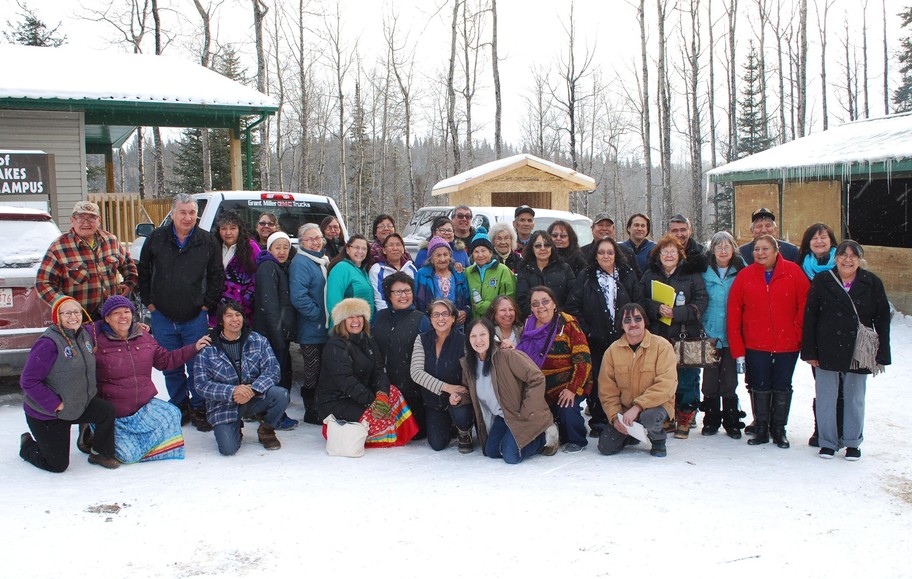KTC - NSD61 enhancing support for Indigenous Language Instructors
Posted on March 6

Group picture of Indigenous Language Instructors, Elders, Facilitators, KTC-NSD61 staff at Cree Immersion Camp!
“It’s instilled in me pride of the Cree Language and feeling very important as a human being.”
- Helena Welsh, Cree Language Instructor, Athabasca Delta Community School
This quote epitomizes the feeling many Indigenous Language Instructors are feeling while attending the Kee Tas Kee Now Tribal Council (KTC) and Northland School Division No. 61 (NSD61) workshops. With funding support from federal and provincial governments, KTC and NSD61 have partnered together to host four workshops in 2016-2017. Lorraine Cardinal-Roy, Director of First Nations, Métis and Inuit Education, says the primary purpose for these workshops is to build capacity and strengthen language and culture.
“When we started these workshops, it was finding out what our Cree and Dene Language Instructors need and what supports we can provide,” said Cardinal-Roy. “These workshops are based on needs for KTC and NSD61 instructors”
Since September, Indigenous Language Instructors are building confidence with utilizing the program of studies and learning how to translate the information into teachable moments. Loreen Auger, Cree Language Instructor at Little Buffalo School says the workshops are helping her to better structure her lesson plans.
“I am learning how to better manage my daily plans, long range plans and lesson plans and to do more Total Physical Response (TPR) with the students,” said Auger.
TPR is a method of teaching language or vocabulary concepts by using physical movement to react to verbal input. It’s an exercise many instructors are now using since learning the technique at the December workshop. Dorothy Nahachick, Cree Language Instructor at Clarence Jaycox School, says the workshops have enhanced the quality of her instruction.
“Before the December workshop, I didn’t know what TPR was or how to use it,” said Nahachick. Since then I have used the technique in my classroom. “I also didn’t have a lot of knowledge about how to create a lesson plan. Since attending the workshops, I have lots of information on how to do it properly.”
As important as the instruction is for these workshops, Helena Welsh, Cree Language Instructor at Athabasca Delta Community School says the networking with the other instructors is just as important.
“Getting all the educators together to share ideas and to learn more about lesson plans and new resources is so helpful,” said Welsh. “I can go back to Fort Chipewyan now and use these plans and ideas and also have the connection to other people if I have questions.”
The KTC-NSD61 workshops supports the Truth and Reconciliation Commission of Canada: Calls to Action number 13, 14 and 15 which speaks to preserving Indigenous language and culture. It’s also helping individuals like Helena to heal after experiencing residential school.
“Personally, it’s helping me to slowly overcome some of the devastating things that happened to me when I was a child,” said Welsh. “Being able to speak it, helping to revive and be proud to speak the Cree language.”
The fourth workshop organized was a little different than the previous three. Indigenous Language Instructors participated in a Cree Language Immersion Camp located at the Marten Lakes Wilderness Camp – Northern Lakes College Campus (February 27th to March 3rd). All activities were conducted in the Cree language with the intention for participants to hear, listen, sing and speak in Cree only. The camp included presentations from elders, knowledge keepers and cultural advisors. The Indigenous Language Instructors used the few days to learn from them and be inspired to infuse local knowledge and culture into the curriculum. A Dene immersion camp is planned at a later date.
“I encourage Indigenous Language Instructors to speak Cree or Dene the minute they enter the school,” says Lorraine Cardinal-Roy. “Speak Cree and Dene in the hallway constantly all the time. And if there’s other Cree and Dene speakers in the school continue to speak the language so students will continue to hear that.”





































